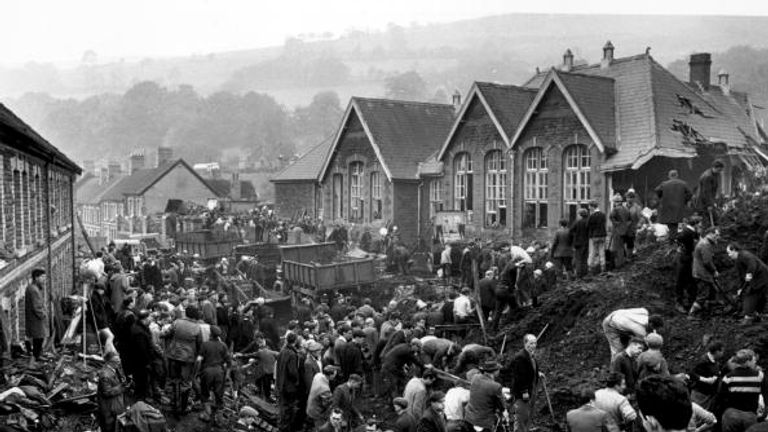How the Aberfan disaster led one man to a 40-year NHS career
Wednesday 4 July 2018 10:31, UK
Dennis Moss spent 41 years as a paramedic in Cardiff and the surrounding valleys after he helped with the recovery efforts from the Aberfan disaster.
As one of the youngest responders on the scene, Mr Moss had the harrowing task of searching for and removing bodies from the rubble, but the disaster sparked a fire in him to help people, and set him on his career path.
Born in India, Mr Moss, now 70, had to fight against racism throughout his career, but used his experiences to push for greater diversity within both the ambulance service and his local community.
He has also taken his skills abroad, helping to teach first aid to teachers and parents in his native India.
My mum was a nurse and she told me about the Aberfan disaster when it was happening, so my friends and I jumped in the car to go to help.
I was in the Territorial Army 158 ambulance service and I knew my uniform would get me in and I could help.
We were clearing the muck and searching for bodies, before taking them to a makeshift mortuary. People were helping us with food, and you might catch 40 winks, but we didn't sleep really.
That was when I decided I wanted to stay working in the community and helping people.
Joining the ambulance service was the best thing I could have done, but I have had hurdles to overcome.
Because my name doesn't match my appearance, sometimes I would go to interviews and they would be surprised that I was Dennis Moss.
A friend helped me get into the NHS and with my wife and family at home, I knew I couldn't turn my back on it.
I have had to face many challenges and hurdles throughout my service which I managed to overcome, especially in the early years.
It made me more determined to change things for other minority people so that they don't have to go through the same things as I did.
In my role now, I have got involved with running awareness courses and training in mosques, temples and other places. I send out key information, for example, when Ramadan starts and finishes, which not everyone knows, and this is circulated with the police as well now.
There will still be a process, and we need promotion and retention of people who look like me.
We serve the community but we do not look like the community.
I would like to encourage more black and Indian people into the paramedics. I know lots of families from ethnic minority backgrounds place a focus on becoming doctors and consultants, but there is an opportunity to go up the ladder in the ambulance service, and the money isn't bad either.
When I retired in 2016, it was 50 years since the Aberfan disaster, but I hadn't been back since, even in all my time in the service. I cried when I was united with survivors.
We have coping mechanisms and the support is better now too. There is a buddy system, and occupational health, but there must be some help for those who suffer PTSD when they retire too.
The best treatment is sometimes with colleagues, because how can you know until you walk a mile in my shoes?
I still think it is an absolutely great place to work, and I would say to anyone to go for a job in the service.
The NHS has also helped me to take key skills back to my home country of India. I returned a few years ago, and having been spoilt by a life here, it was a culture shock to see how things were there.
I have helped install six water pumps in villages, fundraising £1,000 a time to get them in.
On one visit, I heard that a young boy had died in school when he choked on his meal. I then asked if we could help teach first aid for the teachers. Within days I had a flurry of calls and emails and we have been back to teach those skills to schools all over Amritsar.
I would not have been able to do that without the NHS.
I also work in my own community, through Thornhill AFC, a grassroots football club. We have been going for 25 years and we have to fight for our facilities, but it's important to me to be able to give back.
I am very careful to address equality on the board, and to make sure our wording doesn't leave anyone out.
The biggest challenge facing the NHS at the moment is the lack of beds. We have a backlog of patients in ambulance at A&E doors because there is nowhere to put them, so the ambulances cannot get back out to people who need them.
We see patients making appointments to see their GPs and sometimes not getting one for two or three weeks. They phone ambulances as it seems the only way to see a doctor straightway.
I hear ambulance staff saying they joined to help people and not sit outside hospital, working sometimes past their meal breaks and more often than not working past their finishing time.
They are unable to make plans with their families, because they cannot guarantee an on time finish.
I remember when I started we did not have any of these problems.
Morale becomes low because of that and we will see valued members of staff leaving the NHS.
But we are so lucky to have this system in place.










